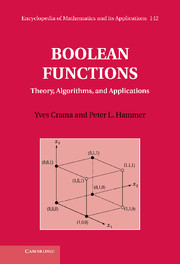Book contents
- Frontmatter
- Contents
- Contributors
- Preface
- Acknowledgments
- Notations
- Part I Foundations
- Part II Special Classes
- 5 Quadratic functions
- 6 Horn functions
- 7 Orthogonal forms and shellability
- 8 Regular functions
- 9 Threshold functions
- 10 Read-once functions
- 11 Characterizations of special classes by functional equations
- Part III Generalizations
- A Graphs and hypergraphs
- B Algorithmic complexity
- C JBool: A software tool
- Bibliography
- Index
7 - Orthogonal forms and shellability
from Part II - Special Classes
Published online by Cambridge University Press: 01 June 2011
- Frontmatter
- Contents
- Contributors
- Preface
- Acknowledgments
- Notations
- Part I Foundations
- Part II Special Classes
- 5 Quadratic functions
- 6 Horn functions
- 7 Orthogonal forms and shellability
- 8 Regular functions
- 9 Threshold functions
- 10 Read-once functions
- 11 Characterizations of special classes by functional equations
- Part III Generalizations
- A Graphs and hypergraphs
- B Algorithmic complexity
- C JBool: A software tool
- Bibliography
- Index
Summary
The concept of orthogonal disjunctive normal form (or ODNF, sometimes called sum of disjoint products) was introduced in Chapter 1. Orthogonal forms are a classic object of investigation in the theory of Boolean functions, where they were originally introduced in connection with the solution of Boolean equations (see Kuntzmann [589], Rudeanu [795]). More recently, they have also been extensively studied in the reliability literature (see, e.g., Colbourn [205, 206]; Provan [759]; Schneeweiss [811]).
In general, however, orthogonal forms are difficult to compute, and few classes of disjunctive normal forms are known for which orthogonalization can be efficiently performed. An interesting class with this property, called the class of shellable DNFs, has been introduced and investigated by Ball and Provan [49, 760]. As these authors established, the DNFs describing several important classes of reliability problems (all-terminal reliability, all-point reachability, k-out-of-n systems, etc.) are shellable. Moreover, besides its unifying role in reliability theory, shellability also provides a powerful theoretical and algorithmic tool of combinatorial geometry, where it originally arose in the study of abstract simplicial complexes (see [96, 97, 205, 206, 254, 569, etc.]; let us simply mention here, without further details, that an abstract simplicial complex can be viewed as the set of true points of a positive Boolean function).
In this chapter, we first review some basic facts concerning orthogonal forms and describe a simple orthogonalization procedure for DNFs. Then, we introduce shellable DNFs and establish some of their most remarkable properties: In particular, we prove that shellable DNFs can be orthogonalized and dualized in polynomial time.
- Type
- Chapter
- Information
- Boolean FunctionsTheory, Algorithms, and Applications, pp. 326 - 350Publisher: Cambridge University PressPrint publication year: 2011



